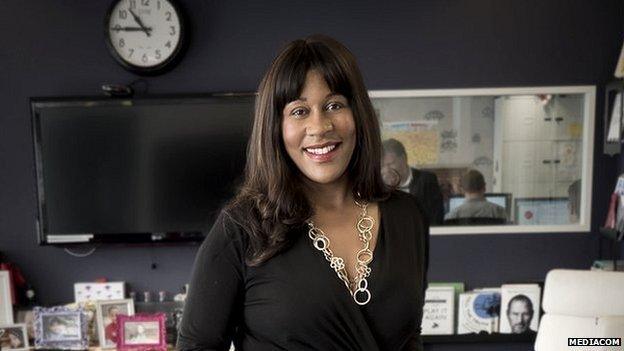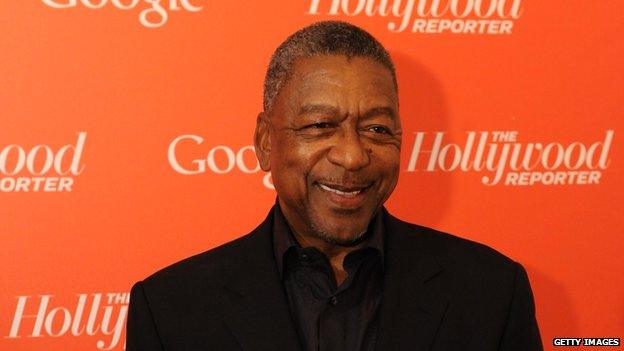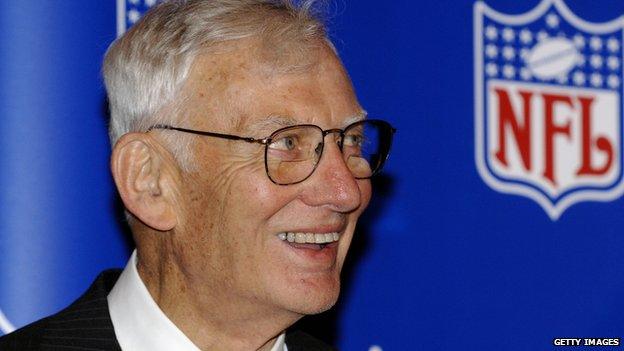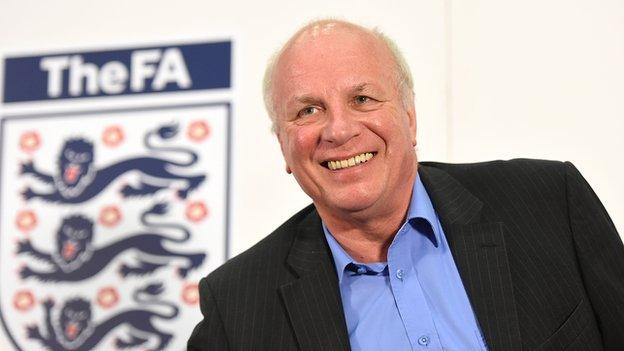Tackling the UK's 'diversity deficit' in the boardroom
- Published

MediaCom boss Karen Blackett ignored her school career adviser's recommendations
"When I was growing up my career adviser gave me two options - a nurse and a teacher," says 43-year-old Karen Blackett.
Ms Blackett, who is now the UK chief executive of global media agency MediaCom, last month became the first businesswoman to top the Powerlist 100, which champions the most influential black people in Britain.
Today she is one of the few exceptions to the current lack of ethnic diversity in British boardrooms.
She manages £1.2bn ($1.8bn) of advertising spending for companies like Procter and Gamble, Shell, Universal, RBS and Volkswagen for MediaCom, and earlier this year she was awarded the OBE.
It's a far cry from her life growing up in Reading as the daughter of parents who had come to Britain in the 1960s.
As for the careers advice, Ms Blackett happily ignored it to pursue her own path.
Being a teacher or nurse are both "worthy careers", she says. But at the time there were limited expectations for her as the daughter of West Indian immigrants. "That's what they felt my career path would be."
These days, while some may question the continuing relevance of lists such as the Powerlist in 21st Century Britain, Ms Blackett insists they are still "incredibly useful".
"It shows the diversity of different jobs or careers that people can go into. [They are] a great source of inspiration for young black people in the UK today," she says.

The government wants firms to recruit more directors from ethnic minority backgrounds
'Diversity deficit'
Later this month Business Secretary Vince Cable is due to launch a plan to have one in five bosses in British boardrooms come from black, Asian and other ethnic minority backgrounds within the next five years.
The government move comes following a survey earlier this year of Britain's top 100 companies by recruitment consultants Green Park that revealed that more than half of FTSE 100 firms have no non-white leaders at board level, external.
Green Park also said that Britain's corporate "diversity deficit" could put UK companies at a serious disadvantage in both domestic and global markets.
Recent research by the consultants McKinsey in its "Diversity Matters" survey, external of 366 organisations and thousands of executives in the UK, US, Canada and Latin America found a statistically significant link between firms with a more diverse leadership and better financial performance.
UK firms that had a 10% higher gender and ethnic or racial diversity in their management teams were found to have on average 5.6% higher earnings than their competitors.
Meanwhile, companies in the top quarter of racial or ethnic diversity were 30% more likely to have above-average financial returns compared to others in their sector.
However, it is crucial to point out that this correlation does not establish a causal link. In other words, it does not prove that firms are more profitable just because they are diverse - there could well be other factors at play here.
McKinsey is rightly cautious about reading too much into its figures, merely saying that the existence of the relationship is statistically significant and consistently present in the data.
"There is a significant correlation between diversity and performance," says UK managing partner, Vivian Hunt. "We don't claim by any means [the data] is perfect but it demonstrates the correlation."

Billionaire Robert Johnson wants US firms to adopt American football's Rooney Rule
'Future-proofing' business
Yet intuitively, many in business do feel that it does make clear commercial sense to recruit at all levels from as wide a pool as possible.
"When businesses open themselves up to a wide range of opinions, backgrounds, ages, genders and sexualities - it enables innovation and counters groupthink," says Simon Walker, director general of the Institute of Directors (IoD)., external
"Commerce is now a truly global affair, but sometimes it seems that companies have failed to grasp this when it comes to their own staff," he adds.
Karen Blackett makes the point that: "If you can have people on your boards that can build empathy and understand the target audience, you're future-proofing your business."
When it comes to broadening Britain's boardroom diversity, many are looking to the United States and in particular, American football's so-called Rooney Rule that has helped change the make-up of management within the sport.
Under this rule, when National Football League (NFL) teams recruit a new head coach they have to interview at least one black or African-American candidate.
The rule could soon be in place in the sporting arena in England too, with Football Association chairman Greg Dyke saying a form of the rule to boost the number of black and ethnic minority coaches in England might be "a good way forward".

American football's Rooney Rule explained

The Rooney Rule says that NFL teams must interview at least one ethnic minority candidate when recruiting new head coaches or general managers
It allows the teams freedom in who actually gets the job
It was established in 2003 after the firing of two African-American head coaches - Tampa Bay Buccaneers' Tony Dungy and Minnesota Vikings' Dennis Green
The rule is named after Dan Rooney (pictured above), chairman of the Pittsburgh Steelers, who is credited with spearheading the change

'Employment gap'
The media magnate Robert Johnson, chairman of the RLJ group and the US's first African-American billionaire, is calling for US firms to consider more non-white candidates for jobs.
He wants US companies to interview at least two African-American candidates for every job opening at vice-president level and above.
"The idea is to create something called enhanced best practice," says Mr Johnson, best-known for founding Black Entertainment Television, the first cable television network aimed at African-Americans.
"You do this because it is in the best interests of your company, best interests of the community, and the best interests of diversity in this nation.
"Without that I don't believe you can ever close the employment gap, the wealth gap and the talent gap between white Americans and black Americans," he says.
"The idea is to say to all Americans that this country would be better off if you made sure that the 30 million African-Americans be given a fair chance to succeed in jobs and business opportunities."
But this is not a call for quotas, he says.
"If they are talented, they get the opportunity, if they're not talented, you don't hire them. There's no mandate to hire anybody, it's only a mandate to consider someone for a job."
Mr Johnson says he has been pleased by the political support his proposal has received from both Republicans and Democrats.
Widening the net
Back in Britain, Karen Blackett agrees that a UK corporate version of the Rooney Rule could be beneficial.
"I think the Rooney Rule could be an interesting model," she says, "That doesn't influence outcome. What it does do is influence input.
"I personally don't agree with quotas just because there could be negative repercussions.
"I do believe in making sure you widen the net, because at the end of the day you want the very best candidate.
"You need to make sure you're fishing [in] not just one part of the pond."
- Attribution
- Published28 November 2014
